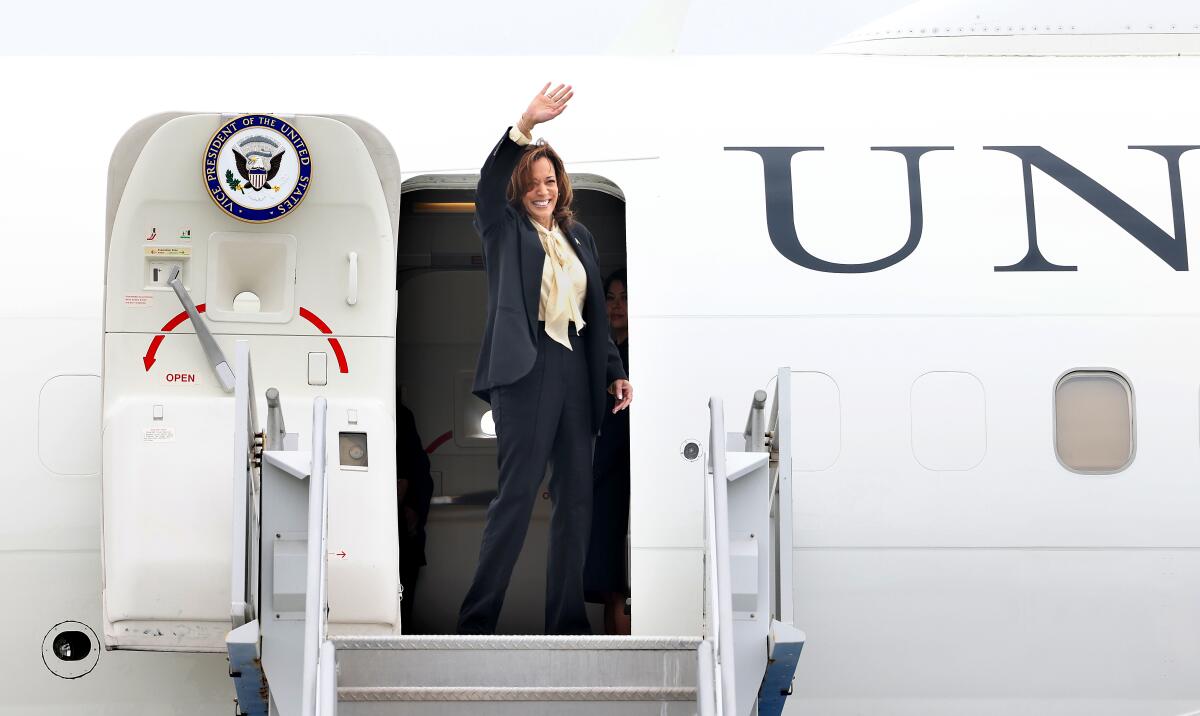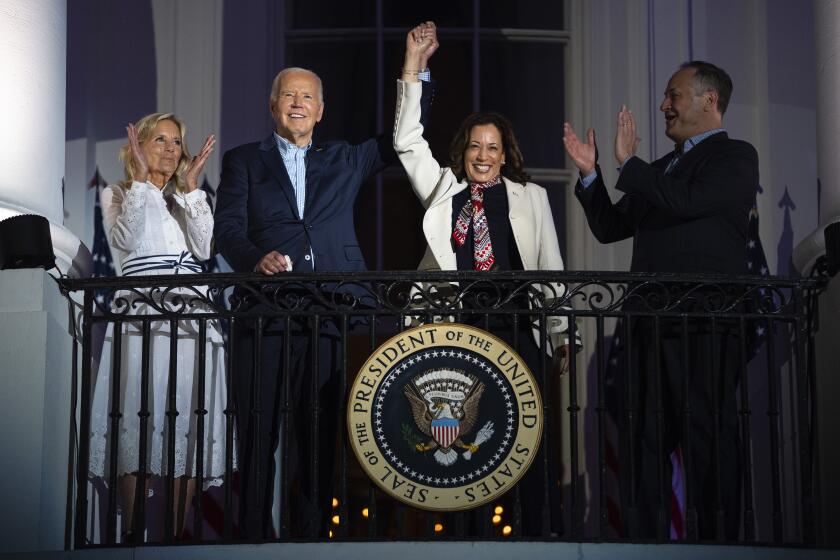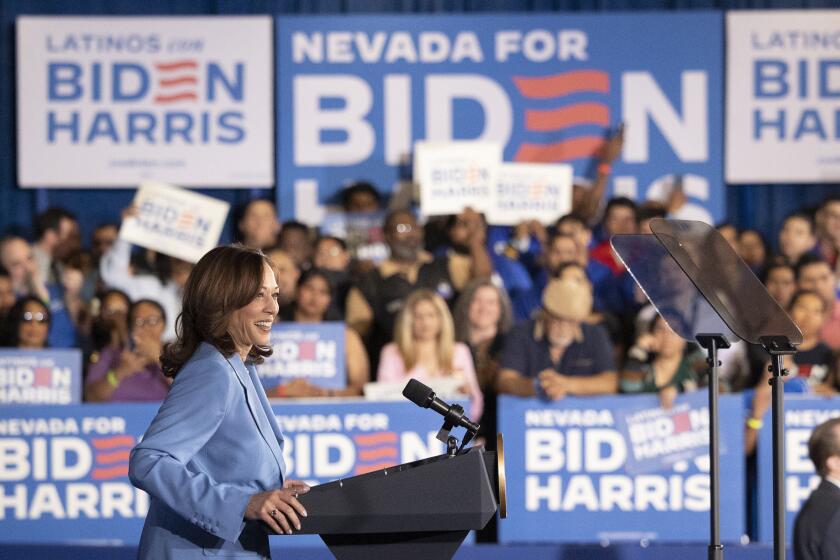Column: Democratic hopes now rest on Kamala Harris. Can the prosecutor beat the convict?

- Share via
Suddenly, Kamala Harris is Democrats’ last best hope to prevent a Trump restoration and the complete MAGA takeover of Washington. It’s a prospect that thrills some fellow Democrats and terrifies others.
As vice president, Harris was always the likeliest political heir to President Biden, whose abandonment Sunday of his uphill reelection campaign advanced her inheritance by several years.
President Biden announces that he will step aside, opening a path for a new Democratic presidential nominee.
Ceding the Democratic nomination to Harris is the quickest and most expedient move for the party, given the limited time before the Aug. 19 start of its nominating convention and the short window to the Nov. 5 election.
There were also political repercussions to consider had Biden passed over the nation’s first female, Black and Asian American vice president. The snub would have antagonized many among a core constituency at a time former President Trump appears to be making meaningful inroads in the Democratic base.
Stepping in to replace Biden, Harris automatically inherits his campaign treasury and campaign infrastructure. It was, after all, the Biden-Harris reelection committee.
That handover is significant. It’s impossible to see any other Democrat building a viable political operation or raising the hundreds of millions of dollars needed to win the White House starting from scratch at this late date.
But Harris being the logical alternative to Biden doesn’t make her anything close to a consensus pick.
President Biden’s decision to bow out of the November election leaves a path for Vice President Kamala Harris to replace him that would have seemed unlikely for most of the last three years.
Some would have preferred a mini-primary of sorts between now and the convention, romanticizing what would have quickly turned into a fractious fight leaving little time to heal before November. A noteworthy parallel is 1968, when President Lyndon B. Johnson abruptly stepped aside rather than seek reelection. Democrats met in Chicago — where, as it happens, next month’s convention gathers — where blood ran in the streets and the disputed nominee, Vice President Hubert Humphrey, limped off to a narrow defeat in November.
Harris it is, for good or ill.
Some concerns about her elevation have to do with perceptions of the American electorate and the nation’s attitude on race and gender. Bluntly stated, a certain segment of the population will never support anyone but a white male for president. Unfair as that may be, it’s nothing Harris can change.
So the question is how her stepping in as the Democratic nominee alters the political dynamics of the presidential race. Will increased enthusiasm in the Black neighborhoods of Detroit, Milwaukee and Philadelphia offset the loss of white support in the rural reaches of Michigan, Wisconsin and Pennsylvania?
Does North Carolina, with its significant Black population, become more competitive? Do New Hampshire and Maine, states that are almost entirely white and predominantly rural, become less so?
We won’t know for a while, but Harris strategists will soon have to determine where and how best to deploy their resources and the time and energy of the vice president and her eventual running mate.
A more important question is whether the vice president has improved as a candidate since her dismal 2020 White House bid. Democrats certainly hope so.
“Her campaign was a mess,” said Jim Manley, who spent decades in the Senate as a communication strategist for Democratic leaders. “It imploded in a furious round of recriminations and she made several strategic errors along the way ... I just have concerns about what kind of campaign she’d run this time around.”
The biggest problem in 2020 was the candidate herself.
The historic nature of her candidacy generated great enthusiasm. But lacking a galvanizing issue or strong ideological base of support, she failed to build upon that excitement.
As a candidate, Harris was tentative and squishy, shifting her position on healthcare and other issues and notably whiffing a political no-brainer like whether the Boston Marathon bomber should be allowed to vote from prison. (After hemming and hawing, Harris said no.)
She dropped out of the race before a single vote was cast, her candidacy — and political promise — going up like so much smoke. By making Harris his running mate, Biden rescued California’s junior senator from the purgatory of Capitol Hill, which she never much liked.
But her early years in the White House didn’t help Harris’ political image. She was handed a tough portfolio of issues, including immigration, and didn’t get much visible help from Biden. Voters can expect to hear a lot from Republicans on how she’s botched her role as “border czar.”
A series of foot-in-mouth appearances early in the administration shook Harris’ confidence, which led to further missteps, which threw her further off keel. Voters can expect to hear a lot from Republicans about her many early gaffes and garble.
But Harris’ performance improved with time — especially after she found an issue to lean into.
The 2022 Supreme Court decision overturning Roe vs. Wade and taking away the national right to abortion presented Harris the purpose she lacked as a presidential candidate. More important, the fight for abortion rights placed Harris in a role, prosecuting the case against Republicans, that is familiar and comfortable to the former courtroom litigator.
No doubt she looks forward to debating Trump, architect of the Supreme Court ruling, who is not likely to bulldoze her the way he did the hapless Biden. Career prosecutor versus convicted felon is a contrast Democrats are eager to make.
Since President Biden’s debate performance, Vice President Kamala Harris has received more attention than at any time since her early, rocky days as his No. 2.
For all of that, Harris could end up being a terrible candidate. Maybe 2020 wasn’t an anomaly. Maybe that’s as good as Harris gets.
But after Biden’s collapse in June’s fateful debate, Democrats faced nothing but bad options. The 81-year-old-and-showing-it president seemed all but certain to lose to Trump, perhaps quite badly, dragging Democratic candidates for the House and Senate down along with him.
Why not take a chance?
Harris may not be the perfect candidate to face Trump. (What candidate made of flesh and blood is?) But she gives Democrats a shot at winning the White House and flipping the House, which many were prepared to write off as long as Biden weighed like an anchor on their ticket.
For that reason alone, the party is in better shape than it was 24 hours ago.
More to Read
Get the L.A. Times Politics newsletter
Deeply reported insights into legislation, politics and policy from Sacramento, Washington and beyond. In your inbox twice per week.
You may occasionally receive promotional content from the Los Angeles Times.














